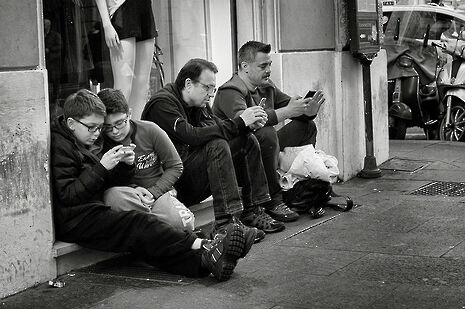How to curb your phone addiction
Tired of mindlessly scrolling down your newsfeed? Here’s how to stop

At the end of last term, my boyfriend and I had a discussion (I refuse to call it an argument). We were having dinner together, but instead of looking at me – or indeed at our food – he was looking at his phone, scrolling through Facebook with his free hand. I remember a friend once telling me about a pet hamster she had who ate its hamster companion and then promptly died of loneliness. I must have a similarly-doomed approach to social interaction, because my way of getting my boyfriend to want to talk to me was to start an argument (sorry, discussion) over the fact that he wasn’t talking to me.
“It’s such a turn-off,” I complained. “Honestly, if I were on a date with someone and they kept checking their phone while we were talking, I’d never want to see that person again. It’s an automatic deal-breaker.”
I was getting eye strain from looking at a screen so much
My boyfriend, at last, looked up. “I’m pretty sure you did that on our first date.” “I most definitely didn’t.” “Yeah, you did. It was out on the table almost the whole time.”
At this point, I forwent words and settled instead on a sort of indignant mumble – mainly because, for all my supposed principles, I had a horrible suspicion he was right.
This got me thinking. Although I make a point of not mindlessly scrolling through social media when I’m around him, it’s true that I’m just as addicted to my phone. Approximately 85% of his camera roll is near-identical photos of me which I’ve bullied him into taking for my Instagram (and then re-taking and re-taking; it’s the affliction of those of us who suffer the dual burden of being irritatingly vain and criminally unphotogenic). It was during the Easter holidays, when I noticed I was getting eye strain from looking at a screen so much, that I decided to start weaning myself off my phone. Here are some of the ways I’ve changed the relationship I have with it:
Change the way you use social media. Okay, so this isn’t strictly about curbing your phone addiction, but I think it’s important to evaluate the ways in which we use technology. It’s no secret that heavy social media usage has been linked to mental health problems, with researchers at the University of Pittsburgh School of Medicine in 2016 citing the exposure to “highly idealized representations of peers” as a trigger for depression. To combat this, you can make sure that the time you spend on apps is as constructive as possible. By following a diverse range of people (and indeed animals) on Instagram, for example, you can make the experience an uplifting as opposed to a dispiriting one. Advocates for body positivity, mental health charities, and anyone that regularly posts photos of dogs are all great places to start – and they make a refreshing change from impossibly-airbrushed celebrities.
Can social media get any more wholesome than this?
Turn off notifications. Imagine if every time you idly checked Facebook messenger or WhatsApp, you were instead checking to see if there was anyone outside your door. Bit weird. I know I obsessively check for new texts, regardless of whether or not I’ve had a notification telling me I’ve got one. By turning your phone on silent and then giving yourself an allotted time to check for notifications, you can stop yourself reaching for your device on impulse and help improve your focus.
Don’t sleep with it nearby. When I leave my phone on my bedside table, it’s the last thing I check at night and the first thing I check in the morning. I’ve now adopted the habit of putting it as far away from my bed as possible (and not just to make sure I’ll actually get up to turn off my alarm). Perhaps the worst thing about mobile phones is also their main selling point – that they’re mobile – so by assigning your phone a place overnight, you alter the dynamic. Your phone is no longer something that follows you; instead, you have to go to it, which for someone as lazy as me is pretty unlikely if it buzzes in the middle of the night. If it’s next to the bed, I find myself reaching for it whenever I can’t sleep. Now, I leave a book of short stories there, and read a couple before I go to bed and another few when I wake up. It’s a much more fulfilling way to start and end the day.
 News / Hundreds of Cambridge academics demand vote on fate of vet course20 February 2026
News / Hundreds of Cambridge academics demand vote on fate of vet course20 February 2026 News / Judge Business School advisor resigns over Epstein and Andrew links18 February 2026
News / Judge Business School advisor resigns over Epstein and Andrew links18 February 2026 News / University Council rescinds University Centre membership20 February 2026
News / University Council rescinds University Centre membership20 February 2026 News / Petition demands University reverse decision on vegan menu20 February 2026
News / Petition demands University reverse decision on vegan menu20 February 2026 News / Caius students fail to pass Pride flag proposal20 February 2026
News / Caius students fail to pass Pride flag proposal20 February 2026










